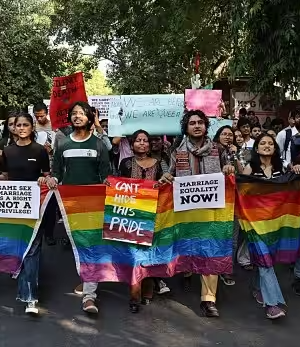Muslims have a saying that encapsulates the recent disappointing verdict on marriage equality, which illustrates how those seeking exemptions from prayers ended up with the additional duty of fasting. In the case of Supriya Chakraborty v Union of India, the hope for recognition of marriages among sexual minorities has been dashed. Even beyond that, it seems that the fundamental right to marry has been lost, marking a significant setback.
In contrast to the unanimous ruling in Navtej Singh Johar (2018) that decriminalized homosexuality, the recent judgment resulted in a majority (3:2) favoring the denial of legal recognition for unions that deviate from heterosexual norms. Unlike in Navtej, where the central government left the decision to the Court’s discretion, it strongly opposed recognizing marriages outside the traditional concept of heterosexual unions. This stance likely had a considerable impact.
Despite dissenting views expressed by the Chief Justice of India and Justice Sanjay Kishan Kaul, who acknowledged the right to establish unions and joint adoption, the bench was resolute in asserting that there exists a fundamental right to marriage under the Indian Constitution.
The petitioners had optimistically requested the Court to reconsider the Special Marriage Act (SMA), 1954, to include same-sex unions, or alternatively, declare it unconstitutional for marginalizing the LGBTQIA+ community. Their hopes were high when the Court prioritized their case for hearing. However, the eventual verdict has left the LGBTQIA+ community and constitutional law scholars deeply disillusioned.
The decision appears to have yielded to prevailing majoritarian morality rather than the frequently referenced “constitutional morality.” The judgment is likely to be hailed as an exemplar of judicial restraint, and any governing body would likely commend it. The Court was clear in its reluctance to undertake innovative interpretative exercises, citing its jurisdictional limits and emphasizing the exclusive legislative authority over such matters. Furthermore, the Court emphasized the inherently secular and progressive nature of the SMA, rejecting the plea to deem it unconstitutional and highlighting the potential regression that might follow if such a measure were adopted. It remains to be seen how the Court will approach the constitutionality of “love jihad” laws, which are inherently at odds with the principles of the SMA.
The Court even narrowed the scope of the nine-judge bench in Puttaswamy (2017) by asserting that it only upheld the right to privacy, not the right to marry. Once the right to union is recognized as a fundamental right, it is puzzling why the right to matrimonial union cannot be inferred. The privacy judgment upheld decisional privacy or the privacy of choice, which ideally encompasses the freedom to enter into a marital relationship.










